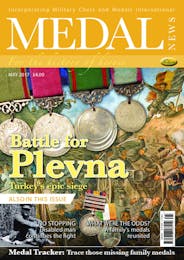Service recognised
FOLLOWING last month’s Editorial “Comment” on the petition being launched to back-date the Officers’ Long Service and Good Conduct Medal to allow those who retired before July 2014 to receive one, a rather upset reader got in touch to point out that we had made something of a glaring omission. The “Comment” had included a list of campaigns, service in which might have seen an Officer entitled to the new medal. Iraq and the Gulf were mentioned, as were the Falklands, Aden, Cyprus, Kenya and a host of others (as well as World War II), but what wasn’t on the list was Northern Ireland. Now the reader in question felt that this might have been done on purpose as the issue of Northern Ireland can still be politically sensitive and maybe we had steered away from the subject to avoid controversy. I can categorically state that this was not the case at all—it was an oversight and nothing more, an error with no motive behind it whatsoever and one for which we wholeheartedly apologise. There was no intention at all to leave anybody out and no implication that those who served in the Province are any less entitled to medallic recognition than anyone who served in any of the areas or campaigns we did mention.
However, there is also no denying that Northern Ireland was missed out—which is odd considering it is the one campaign that had more effect on me personally than any other. Many of you will, like me, remember the Provisional IRA bombing campaign on the British mainland; you will remember the signs telling you to be vigilant, remember the horrific pictures on the 9 o’clock news (the images of the dead horses after the Hyde Park bombing stay with me still), remember the everyday fear of not quite knowing where or when the next attack would take place . . . . All of that had a marked effect on me and, I’m sure many others. Indeed it has been suggested that the British people are so resilient and stoic in the face of recent Islamic extremist attacks because so many of us lived through those dark days of the 1970s and ’80s—and yet still it is a campaign that is often overlooked, and I wonder why. Is it perhaps because the Northern Ireland “Troubles” are, at least as far as medal collectors are concerned, something of an anomaly? Allow me to explain.
Back in 1916 when the Irish Rising was taking place, men of the British Army (most famously perhaps the Sherwood Foresters) were sent to Dublin to quell the rebellion. It is said that many of the soldiers who were shipped out across the Irish Sea assumed they were going to France and only realised they weren’t about to face the might of the Hun when they were welcomed at Dun Laoghaire by English-speaking crowds. During the days of the Rising these young men might as well have been in France (apart from the lack of trenches of course). They were shot at, wounded and many were killed; they won gallantry medals and in the case of casualties their next of kin were given memorial plaques—exactly like those who were fighting on the Continent, with one crucial difference: no campaign medals. A man invalided out of the Foresters in 1916 would have no medallic recognition whatsoever, just a Silver War Badge for his troubles as, at the time, service in Ireland was considered home service and thus not eligible for either a War Medal or a Victory Medal. Fast forward a few decades and suddenly service in the United Kingdom DOES count. Those men and women of the United Kingdom armed forces serving in one of the countries of that United Kingdom are, after 1969, now eligible to have that service recognised. Think about that for a second: what is in effect “home service” is recognised by a clasp on the General Service Medal. That’s certainly not something that has happened before or since and actually I am quite surprised that those campaigning for a “Service Medal” today haven’t cited it as a precedent. That medallic anomaly is, perhaps, one reason Northern Ireland is overlooked in lists of campaigns: people may view it as “home service” and not see it in the same light as a full-on military campaign like the Falklands or the Gulf War, but that would be a mistake. Those who served in Northern Ireland did so with as much bravery and loyalty as those who served in Aden, the Gulf, Cyprus or in Afghanistan today and should never be overlooked. I apologise again for doing so.

Archives
-
2024 (10 articles)
-
2023 (22 articles)
-
2022 (26 articles)
-
2021 (29 articles)
-
2020 (44 articles)
-
2019 (23 articles)
-
2018 (21 articles)
-
2017 (27 articles)
-
2016 (32 articles)
-
2015 (25 articles)
-
2014 (30 articles)
-
2013 (46 articles)
-
2012 (32 articles)
-
2011 (44 articles)
-
2010 (75 articles)
-
2009 (49 articles)
-
2008 (42 articles)
-
2007 (51 articles)
-
2006 (48 articles)
-
2005 (7 articles)
-
2004 (7 articles)
-
2003 (12 articles)
-
2002 (11 articles)
-
2001 (5 articles)









